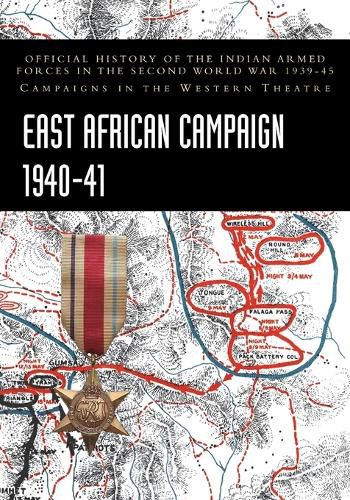Readings Newsletter
Become a Readings Member to make your shopping experience even easier.
Sign in or sign up for free!
You’re not far away from qualifying for FREE standard shipping within Australia
You’ve qualified for FREE standard shipping within Australia
The cart is loading…






This title is printed to order. This book may have been self-published. If so, we cannot guarantee the quality of the content. In the main most books will have gone through the editing process however some may not. We therefore suggest that you be aware of this before ordering this book. If in doubt check either the author or publisher’s details as we are unable to accept any returns unless they are faulty. Please contact us if you have any questions.
This volume covers the role of Indian armed forces in East Africa, the region covering Eritrea and Ethiopia. General Wavell, Commander in Chief of Middle East Command, mounted an invasion of Libya and, in spite of superior Italian strength, two divisions (of which the deadliest being the 4th Indian Division) pushed the Italians back in North Africa to Benghazi, of which the battle of Sidi Barani is well known. Then, suddenly, troops had to be sent to Greece to contain the Germans.
It was then decided to undertake a campaign in East Africa for which the 4th Indian Division was pulled out of action in North Africa. The plan eventually culminated in a pincer from Nairobi in Kenya in the south and Khartoum in the north. The northern force included the 4th and 5th Indian divisions and the southern one had one South African and two African divisions. The main task of the Indian divisions was to open the route to Massawa and drive the Italians out of Eritrea. Important battles were the capture of Keren and the move to Asmara and beyond. This remarkable achievement by the Indian divisions led to the final victory in East Africa and freeing of the Red Sea and Indian Ocean from any threat. 4th Indian Infantry Division then reverted back to North Africa, but by then the situation there had changed for the worse.
$9.00 standard shipping within Australia
FREE standard shipping within Australia for orders over $100.00
Express & International shipping calculated at checkout
This title is printed to order. This book may have been self-published. If so, we cannot guarantee the quality of the content. In the main most books will have gone through the editing process however some may not. We therefore suggest that you be aware of this before ordering this book. If in doubt check either the author or publisher’s details as we are unable to accept any returns unless they are faulty. Please contact us if you have any questions.
This volume covers the role of Indian armed forces in East Africa, the region covering Eritrea and Ethiopia. General Wavell, Commander in Chief of Middle East Command, mounted an invasion of Libya and, in spite of superior Italian strength, two divisions (of which the deadliest being the 4th Indian Division) pushed the Italians back in North Africa to Benghazi, of which the battle of Sidi Barani is well known. Then, suddenly, troops had to be sent to Greece to contain the Germans.
It was then decided to undertake a campaign in East Africa for which the 4th Indian Division was pulled out of action in North Africa. The plan eventually culminated in a pincer from Nairobi in Kenya in the south and Khartoum in the north. The northern force included the 4th and 5th Indian divisions and the southern one had one South African and two African divisions. The main task of the Indian divisions was to open the route to Massawa and drive the Italians out of Eritrea. Important battles were the capture of Keren and the move to Asmara and beyond. This remarkable achievement by the Indian divisions led to the final victory in East Africa and freeing of the Red Sea and Indian Ocean from any threat. 4th Indian Infantry Division then reverted back to North Africa, but by then the situation there had changed for the worse.